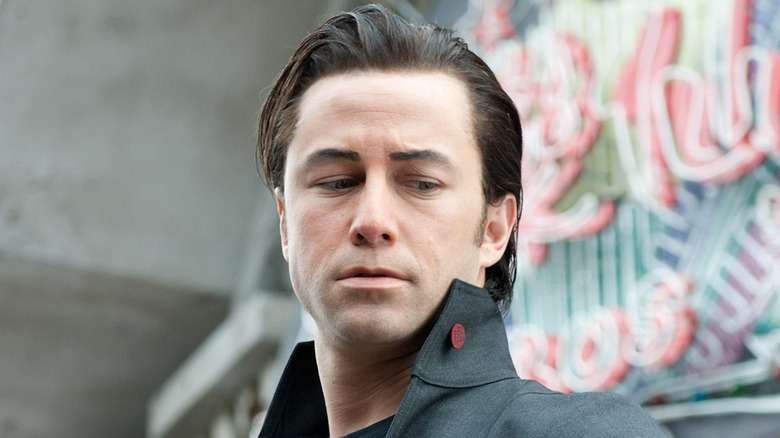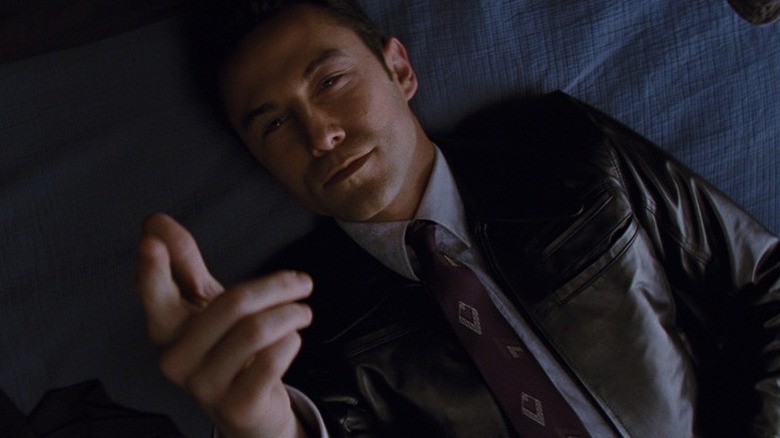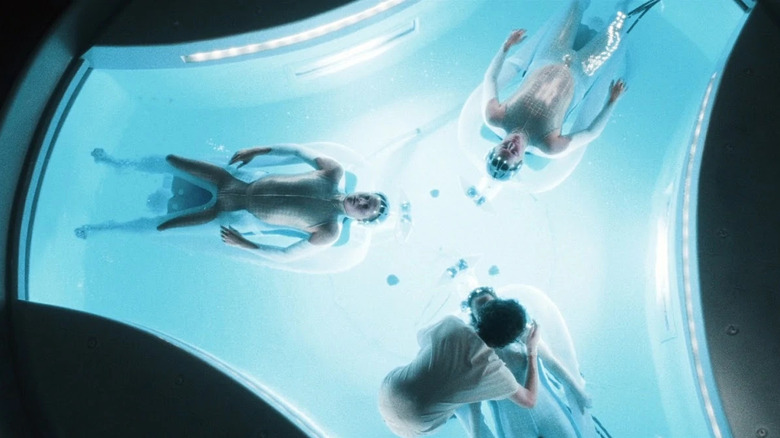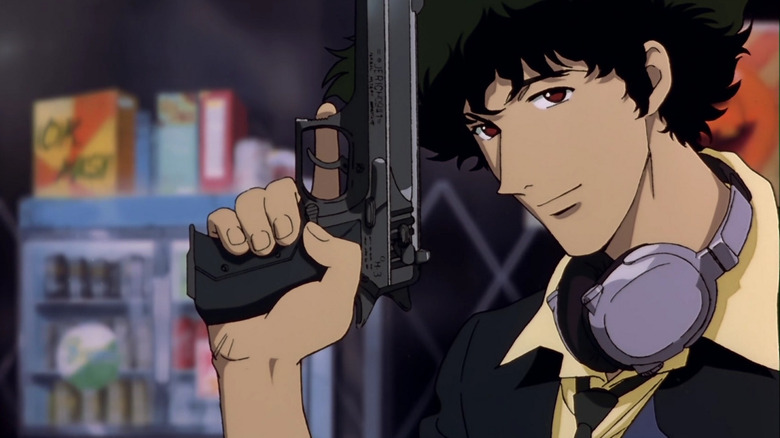Looper Was Rian Johnson's Chance To Make A Film That Fit In The World Of Philip K. Dick
Rian Johnson is a man who knows what genres he wants to work in and sticks with them. Barring his second movie, the con caper "The Brothers Bloom," all of his feature films have been mysteries or science-fiction.
"Looper" is a bit of a combination of his favorite genres. On the sci-fi end, the movie is centered around time travel and there are other genre hallmarks like hover-bikes and telekinetic superpowers. While its story doesn't involve a murder mystery, the future of "Looper" does have some film noir flavor. Joe (Joseph Gordon-Levitt) lives in a grungy metropolis and is a hitman, killing mob targets from the future sent back in time. Like any criminal protagonist, Joe is looking to get out of the game, but first he has to do one last job: killing his future self (Bruce Willis). "Old Joe" did manage to find a normal life, but his past caught up to him.
Johnson wears his literary influences on his sleeves. "Brick," his feature directing debut, was inspired by Dashiell Hammett, writer of classic hardboiled detective stories. Hammett's novel "The Maltese Falcon" was adapted by John Huston and is now the go-to example of film noir. Johnson's Benoit Blanc duology (soon to be a trilogy), "Knives Out" and "Glass Onion," pull from Agatha Christie. In the same way that Blanc feels like he could exist alongside Hercule Poirot, Johnson wanted "Looper" to feel like it was set in a world written by Philip K. Dick.
The road to Looper
Rian Johnson discussed the genesis of "Looper" with IndieWire in 2012. He'd originally conceived of the film as a short, not a feature. Indeed, the novel premise of "Looper" (a man killing his older self sent back in time) would kill as a 10-minute film. However, Johnson wound up sitting on the idea for years. When he revisited it, he decided to make a full-length film instead:
"It was just this basic idea I'd had, of the old man and a young man; Joe working for the mob in the future, and them sending them back his older self to be killed [...] and over the past couple of years, some bigger ideas attached themselves to that, and I realized 'oh this little cool plot device can make a movie that's about this.'"
Johnson's aim was to make a movie that wasn't about time-travel, but where time travel factored in to a character-based story. In a 2012 interview with The Hollywood Reporter, he explained:
"It's not a film like 'Primer' [...] where the big part of the enjoyment is kind of working out all the intricacies of it [...] So the biggest challenge was figuring out how to not spend the whole movie explaining the rules [...] get past it and deal with the real meat of the story."
That doesn't mean Johnson dislikes science-fiction at all. "When I wrote the short [that became 'Looper'], I was in the middle of reading Philip K. Dick's books, and I'd wanted to do something in that world for a while," he noted to IndieWire. Dick, a writer frequently adapted by Hollywood, was a "concept feeding character" storyteller just like Johnson is.
A Dick-ish future
Philip K. Dick's most famous work is probably "Do Androids Dream of Electric Sheep?" The 1968 sci-fi novel takes place in a dystopian world where most natural life has gone extinct. To replace extinct species, scientists have created organic androids called "Replicants." The protagonist is Rick Deckard, a bounty hunter assigned to hunt down fugitive Replicants modeled after humans. The novel asks what makes someone truly alive, but the question is posed through the characters (namely Deckard and the replicants Roy Batty and Rachael Rosen).
Many people are familiar with this story thanks to Ridley Scott's film adaptation, "Blade Runner." Aside from transposing the novel's themes, "Blade Runner" practically created the "cyberpunk" genre with its depiction of a rainy Los Angeles home to flying cars, huge holographic screens, and pyramid palaces. Countless films, "Looper" included, have replicated this urban aesthetic.
Joseph Gordon-Levitt's Joe resembles Deckard, a cynical assassin killing individuals who don't deserve it. However, the themes of "Looper" are closer to a different Dick story — "Minority Report." A novella adapted to the screen in 2002 by Steven Spielberg, the story depicts a future where police can detect crimes before they happen and arrest the perpetrators.
The premise naturally opens up question of fate and pre-determinism, as do stories about time-travel. Is the future pre-ordained? "Looper" suggests it is not. "Old Joe" sets out to change his future and save his wife (Xu Qing) by killing the future crime boss "The Rainmaker" while he's a child. He succeeds, but not how he planned to. Young Joe kills himself, erasing old Joe and allowing Cid (Pierce Gagnon), the future Rainmaker, to grow up peacefully with his mother Sara (Emily Blunt).
Western sci-fi noir
Here's a question about "Looper"— why is it set in Kansas City? Most famous noirs are set in New York City or Los Angeles, so why not have the movie take place there? Because there's one more genre the film pulls from: westerns. The characters wield mostly revolvers and shotguns, archetypal cowboy weapons, and "Kid Blue" (Noah Segan) has a name like an old-fashioned gunslinger. The second half of "Looper" also moves away from the urban setting of the first, instead taking place on Sara's farmhouse with cornfields for miles around.
Rian Johnson isn't the first one to throw noir, western, and sci-fi tropes together. "Cowboy Bebop," the much-beloved anime, counts Johnson among its fans. The Bebop crew may be cowboys, but the frontier they traverse is an interstellar one; Earth is in disrepair and people have spread across the solar system. These "off world colonies" evoke "Do Androids Dream of Electric Sheep?" while Mars is the new cornerstone of civilization in both "Bebop" and "We Can Remember It for You Wholesale" (Dick's novella, which was adapted to film as "Total Recall").
"Cowboy Bebop" director Shinichirō Watanabe combined all his favorite genres into one; "Bebop" often feels like a mixtape made from "Blade Runner," "The Asphalt Jungle," "Enter the Dragon," and a Charlie Parker record. Johnson operates the same way and his playlist includes "Bebop" itself. In "Looper," he made a film where neither Rick Deckard nor Spike Spiegel would feel out of place.



